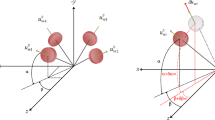Abstract
An attitude reorientation control is proposed for a microsatellite with pointing and angular velocity constraints. In order to guarantee the measure performances of the optical instruments equipped on the microsatellite, these optical instruments are required to point their boresight along a target direction while keeping away from direct exposure to the bright celestial bodies. However, the limited space of the microsatellite may lead to a more complicated attitude path planning compared with the traditional large spacecrafts. In this paper, a reorientation control method integrating the logarithmic convex potential function with the fixed barrier Lyapunov function is introduced to solve the attitude path planning issue. Comparing with the existing on-line path planning methods, the proposed method can efficiently reduce the computation burden and is very fit for the microsatellite with low computation ability. Moreover, the angular velocity constraints caused by saturation limitation of low-rate gyro or mission specification requirement are also well tackled by the proposed method. The ultimate uniformly stabilization for the closed-loop system is achieved without violating the considered constraints. Finally, the simulations are verified in order to demonstrate the effectiveness of the proposed reorientation control method for a microsatellite.
Access this chapter
Tax calculation will be finalised at checkout
Purchases are for personal use only
Similar content being viewed by others
References
McInnes, C.R.: Large angle slew maneuvers with autonomous sun vector avoidance. J. Guidance Control Dyn. 17(4), 875–877 (1994)
Wie, B., Lu, J.: Feedback control logic for spacecraft eigenaxis rotations under slew rate and control constraints. J. Guidance Control Dyn. 18(6), 1372–1379 (1995)
Hablani, H.B.: Attitude commands avoiding bright objects and maintaining communications with ground station. J. Guidance Control Dyn. 22(6), 759–767 (1999)
Melton, R.G.: Hybrid methods for determining time-optimal, constrained spacecraft reorientation maneuvers. Acta Astronaut. 94, 294–301 (2014)
Kjellberg, H., Lightsey, E.: Discretized constrained attitude pathfinding and control for satellites. J. Guidance Control Dyn. 36(5), 1301–1309 (2013)
Kim, Y., Mesbahi, M., Singh, G., Hadaegh, F.: On the convex parametrization of spacecraft orientation in the presence of constraints and its applications. IEEE Trans. Aerosp. Electron. Syst. 46(3), 1097–1109 (2010)
Lee, U., Mesbahi, M.: Feedback control for spacecraft reorientation under attitude constraints via convex potentials. IEEE Trans. Aerosp. Electron. Syst. 50(4), 2578–2592 (2014)
Shen, Q., Yue, C., Goh, C.H., Wu, B., et al.: Rigid-body attitude tracking control under actuator faults and angular velocity constraints. IEEE/ASME Trans. Mechatron. 23(3), 1338–1349 (2018)
Hu, Q.L., Li, B., Zhang, Y.M.: Robust attitude control design for spacecraft under assigned velocity and control constraints. ISA Trans. 52(4), 480–493 (2013)
Slotine, J.J.E., Li, W.: Applied Nonlinear Control. Prentice Hall, New Jersey (1991)
Khalil, H.K.: Nonlinear Systems, 3rd edn. Prentice Hall, New Jersey (2002)
Tee, K.P., Ge, S.S., Tay, E.H.: Barrier Lyapunov functions for the control of output-constrained nonlinear systems. Automatica 45(4), 918–927 (2009)
Author information
Authors and Affiliations
Corresponding author
Editor information
Editors and Affiliations
Rights and permissions
Copyright information
© 2019 Springer Nature Switzerland AG
About this paper
Cite this paper
Feng, Zx., Guo, Jg., Zhou, J. (2019). Reorientation Control for a Microsatellite with Pointing and Angular Velocity Constraints. In: Yu, H., Liu, J., Liu, L., Ju, Z., Liu, Y., Zhou, D. (eds) Intelligent Robotics and Applications. ICIRA 2019. Lecture Notes in Computer Science(), vol 11741. Springer, Cham. https://doi.org/10.1007/978-3-030-27532-7_62
Download citation
DOI: https://doi.org/10.1007/978-3-030-27532-7_62
Published:
Publisher Name: Springer, Cham
Print ISBN: 978-3-030-27531-0
Online ISBN: 978-3-030-27532-7
eBook Packages: Computer ScienceComputer Science (R0)




